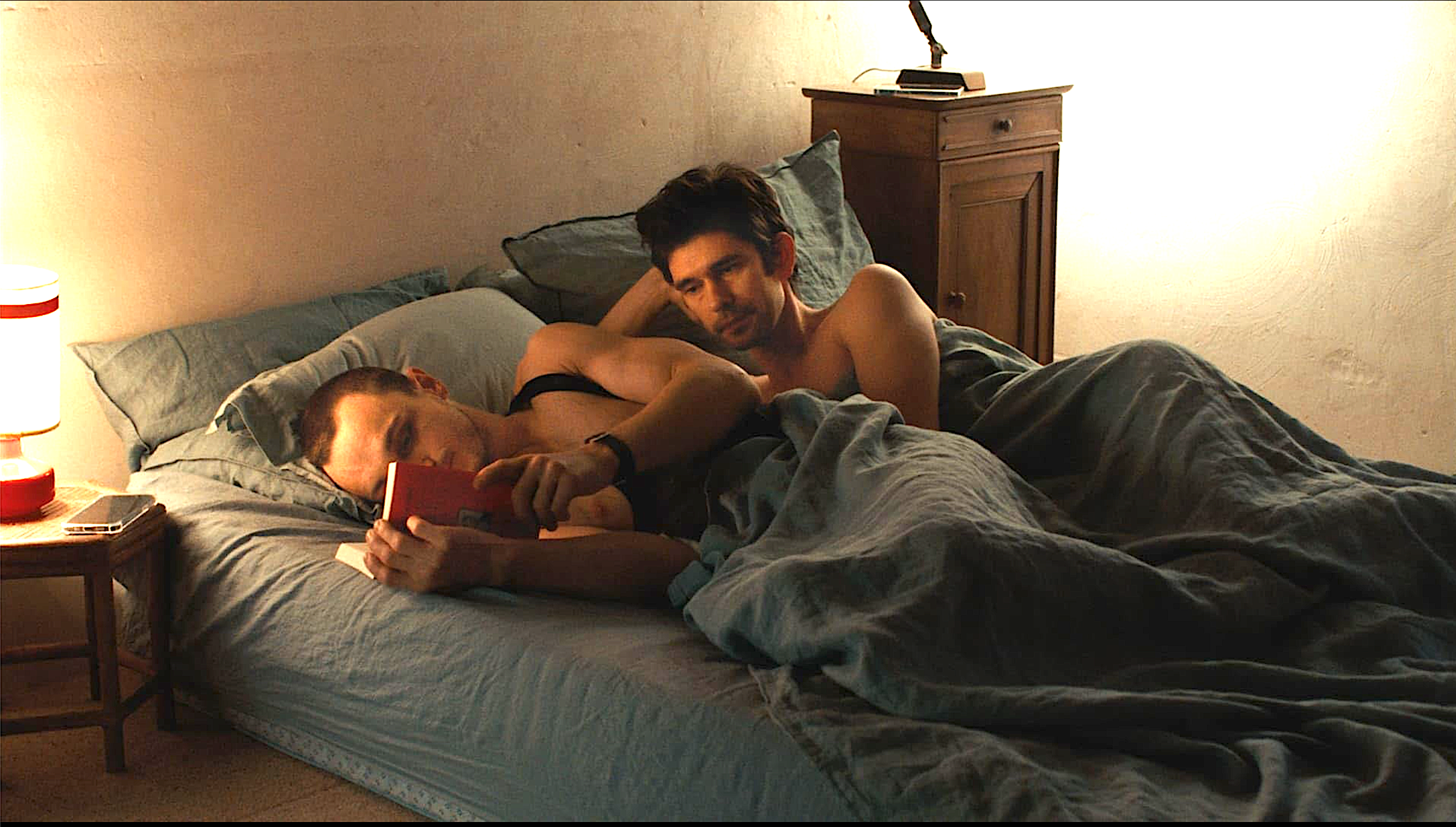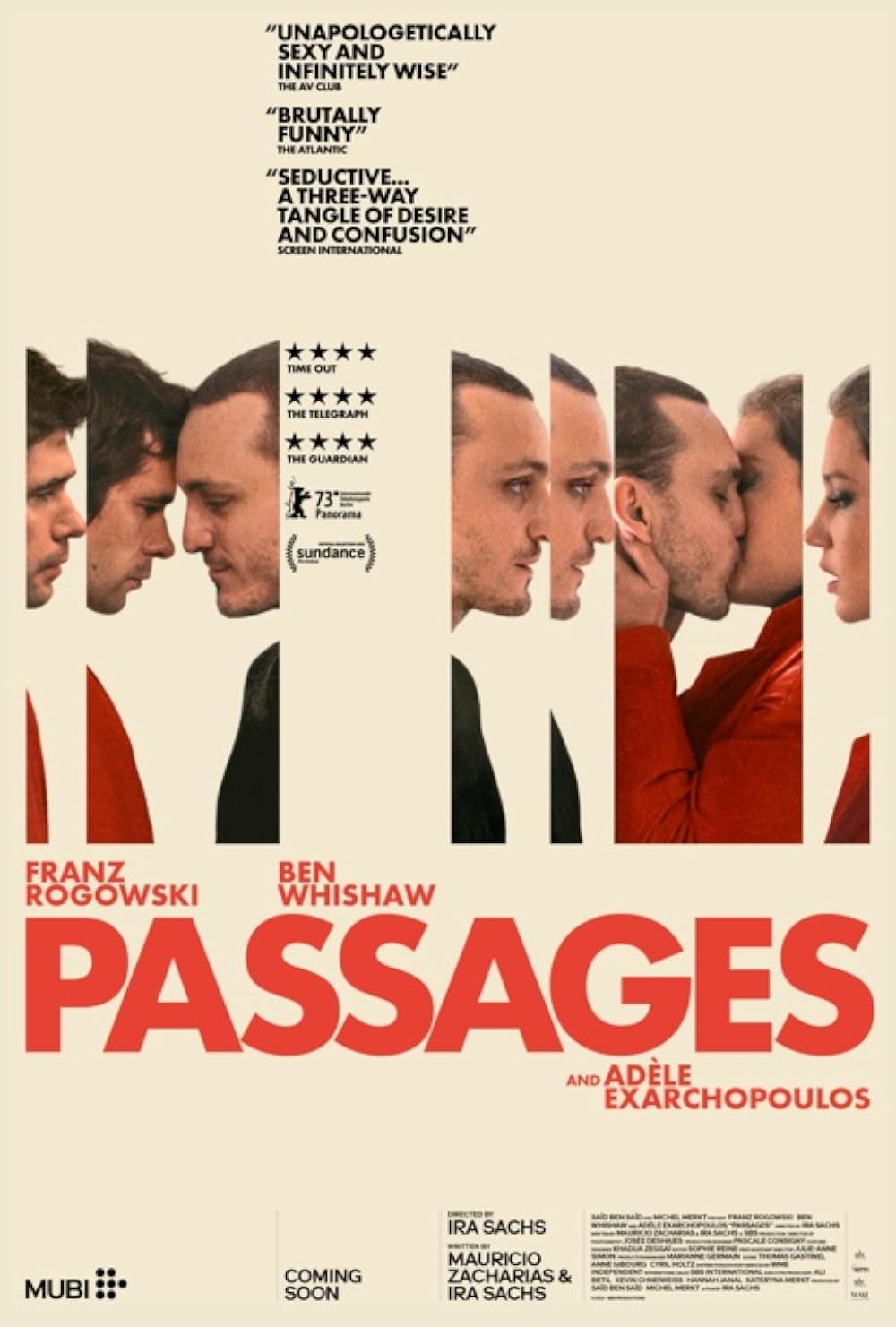LIKE PASSAGES, Ira Sachs’ latest film, his 2014 film Love Is Strange had a gay couple at its center. But while the earlier film featured a longtime pair of sympathetic aging men (John Lithgow and Alfred Molina) living apart under forced economic circumstances, Passages focuses on two thirty-something married artists who prosper on the cultural cutting edge, with an apartment in Paris and a modest retreat in the country. One of them, Tomas (Franz Rogowski), a film director originally from Germany, experiments sexually with a woman, Agathe (Adèle Exarchopoulos), and, finding satisfaction in the adventure, matter-of-factly informs his British husband Martin (Ben Whishaw) of this episode.
So begins an exploration of today’s rather cool, perhaps even cruel, sexual mores. The trilingual story proceeds with plot twists and character turns that keep us guessing as to who will end up with whom and where Sachs’ emotion-driven plot is headed. Tomas is the story’s engine, setting in motion psychic eruptions that jangle this particular triangle. The movie opens with him directing his actors in a scene set in a bar. Something in his no-nonsense and abrupt manner, as he instructs one actor to repeat, and repeat, walking down a flight of stairs, reveals Tomas as both professionally decisive and socially ruthless. He is the authority who states what he wants frankly yet without the niceties that might cushion the blow.
Tomas encounters Agathe at his movie’s wrap party, where he and Martin are drinking as dance music prompts folks to pair up. Tomas first asks Martin to dance, but Martin, a cool customer in Whishaw’s emotionally reserved performance, declines. Tomas turns to Agathe, a dark beauty with a voluptuous figure, and they take to shimmying on the dance floor. They wind up at her place for a night of hot sex.

Arriving late next morning at his and Martin’s apartment, Tomas casually shares the news of having slept with Agathe and wants to talk about it. Martin isn’t having any of it. What starts as a spontaneous affair soon finds Tomas moving in with Agathe, which encourages Martin to invite Ahmad (Erwan Fale), a handsome Black man, into his life. While the time elapsed between episodes is not always clear, we see that Agathe was initially suspicious of Tomas’ too quick avowal of “falling in love” with her. “You say that a lot, I imagine,” she remarks. Tomas assures her, “I say it when I feel it.” Agathe shrewdly counters, “You say it when it works for you.” Martin understands his husband’s behavior as part of pattern. We come to understand that Tomas’ direct expressions of his needs and feelings is also a form of manipulation. He doesn’t always appreciate his own motives or impulses, but it seems this display of selfish naïveté serves him well.
When Agathe invites her parents to meet Tomas at a dramatic moment in their relationship’s progress, the audience squirms through Sachs’ wonderfully staged set piece of the awkward first encounter between family members. Running late for the planned introductory luncheon, Tomas arrives by bike, his trusty mode of local transit, wearing a sheer form-fitting midriff-baring top. This surprises Agathe’s solid bourgeois father, who extends his arm for a manly handshake. Tomas has to readjust and quickly changes his outfit for the luncheon table. Agathe’s father and mother (Caroline Chaniolleau) try to feel out Tomas’ intentions vis-à-vis their daughter, who is pregnant by Tomas, but the queer artist-bohemian chafes at being interrogated, despite the mother’s obvious attempt to maintain a tone of curious inquiry as she seeks precision about his recently ended gay marriage. In short, it’s the in-law introduction from hell.
The route to the film’s ending is unexpected. If Sachs avoids pat psychological explanations, his characters plumb the mores of our contemporary moment, when standard sexual identity labels are breaking down. Is Tomas’ switch to heterosexual ardor credible? How can Agathe trust the prospective commitment of this man who has walked away from an apparently stable gay marriage? We may be forgiven if we feel that none of Sachs’ characters is really all that nice. However, as in his opening shots of Tomas working as a director, Sachs allows us brief glimpses into Agathe and Martin’s professional lives. We find that Martin, a successful commercial printmaker, in that guise behaves collegially in a cooperative environment. Meanwhile, Agathe, a full-time grade schoolteacher, reliably leads a class of young students, encouraging discipline and self-reliance.
A moment arrives when it appears that the three protagonists might form a “throuple.” By then we have witnessed separate scenes of sexual intimacy—one between Tomas and Agathe, another between Tomas and Martin—of a stunning frankness barely imaginable in a commercial product from Hollywood. Rogowski, in the 2021 Austro-German film Great Freedom, playing a “criminal” gay recidivist in post-World War II Germany (see my G&LR review in the May-June 2022 issue), displayed a masterful palette of emotional colors. In these scenes in Passages, he and Whishaw and Exarchopoulos dig deep into the erotic human essence. Although the film’s final scenes offer no clear resolution, we still feel we have seen something true and perplexing about the hazards of contemporary love and sex. Like the three characters, we are sadder but wiser. Maybe.
Allen Ellenzweig, a longtime G&LR contributor, is the author of George Platt Lynes: The Daring Eye (Oxford Univ. Press, 2021).






